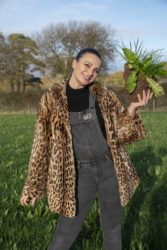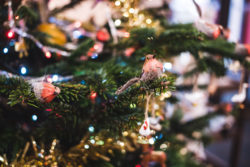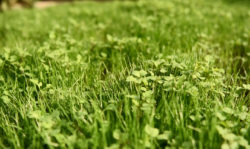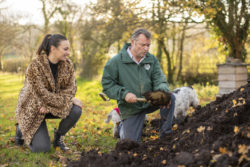Friday 18th December 2020

We got together with our friend, chef and award-winning food writer, Gizzi Erskine to think about ways that we can all Put Nature First at this festive time of year.
We all want to have a great Christmas but that doesn’t mean we can’t be more sustainable at the same time. If you’re trying to be greener this year, why not take a look at these tips to see if any of them work for you?
Create your own compost
Home-made compost is a fantastic way of recycling plant material, feeding plants, promoting soil life and locking carbon back into the ground. Keep your Christmas veg peelings, apple cores, banana skins and mouldy fruit – when added to a compost bin they will mulch down over time, encouraging worms, woodlice and insects to digest the food and create a pile of nutrient rich compost to spread on your soil.
Put biodegradable cardboard & paper in your compost
Did you know the best way to speed up your compost is to have a 50 / 50 split of green and brown waste? Brown waste includes paper and cardboard, so that’s the biodegradable Christmas cards and delivery boxes sorted! If your cards have glitter on them or can’t be recycled for any reason, put them away to make into gift tags next year.
Compost your Christmas tree

Your whole Christmas tree including the pine needles, can be added to your compost. It needs to be chopped into small pieces – a hand saw will work up a sweat but if you have access to a woodchipper, that will certainly speed up the process! Make sure you remove all the decorations and baubles (and eat all the chocolates) before adding to your compost.
Get a wormery
Ask for a wormery for Christmas and feed them all your Christmas waste – they can eat a HUGE variety of things including cooked food scraps, fruit and vegetable peelings, tea leaves, coffee grounds, egg shells, bread, pasta and rice…..yes really!
Switch some of your everyday purchases to organic ones
Supporting organic farming can help to slow down climate change. If you’re on a mission to make a difference, a really simple step you can make is to swap out your current groceries, like milk, cheese and yogurt, with organic alternatives. Even just 1 swap can make a real difference.
Buy grass-fed meat, little and often
The grazing of plants by animals has a major, positive impact on climate change by cycling more carbon out of the atmosphere and putting it into the soil. By occasionally choosing to buy high-quality meat, you can have a positive impact on the environment.

Cover it up
Keeping any bare soil covered at all times helps to protect it and prevent erosion. The best way to do this is by planting a layer of green manure (fast growing plants like clover, mustard or grazing rye). The plants that make up green manure are normally part of the legume family and pull carbon down from the atmosphere through photosynthesis, making carbohydrates and sugars that travel through the roots and into the soil, feeding the millions of microorganisms that live in the earth. You can buy seed mixes from most garden centres.
Buy gifts that will last
Whilst you’re at the garden centre, why not grab a few ‘seed bombs’ or butterfly and bee friendly seed mixes to gift to the wildlife lovers in your life. A potted plant is a good one for those hard to buy for friends that don’t have a garden.

Can you dig it? No, you can’t
Digging destroys soil structure – tearing apart the home created by living organisms that create natural soil fertility. Avoid the use of chemical pesticides and artificial fertiliser which are designed to kill insects and other pests.
Mix it up
Aim to introduce a range of different plants to create biodiversity in your garden. Grasses, shrubs, vegetables and legumes all thrive in harmony with each other and each of them plays a role in maintaining soil health.
Have you got any tips for a greener Christmas? Let us know what they are so we can add to our list!





Great ideas. Our soil is ‘clay’ , so every year we compost and add this to the flower and veg beds. Its slowly improving!
I love this!